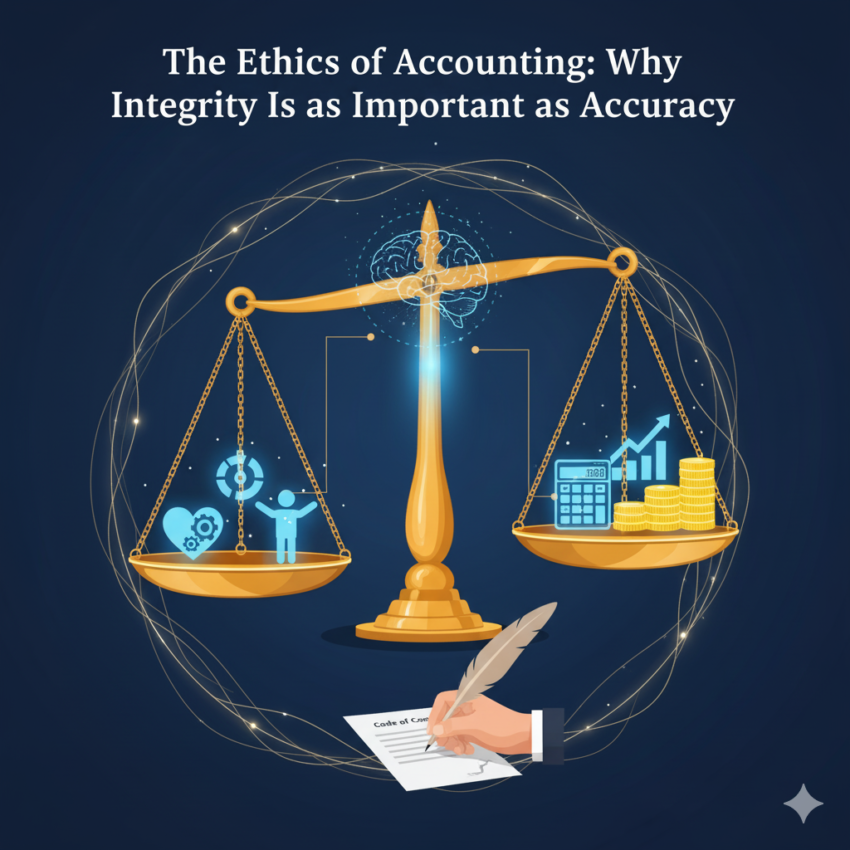When most people think of accounting, they imagine spreadsheets, debits, and credits. But beneath the numbers lies something far more important: ethics. Accounting isn’t just about technical precision—it’s about trust, fairness, and responsibility.
Every financial statement influences investors, employees, regulators, and even the public. And when ethics are ignored, the fallout can be devastating—from billion-dollar frauds to shattered livelihoods.
In this guide, we’ll unpack:
- What accounting ethics really means
- Why ethics in accounting matters more than ever
- The five guiding principles of accounting ethics
- Common ethical dilemmas accountants face
- Famous accounting scandals that shook the world
- Best practices businesses can adopt in 2025 and beyond
What Do We Mean by Accounting Ethics?
At its core, accounting ethics is the moral compass of the financial world. It’s about applying honesty, transparency, and fairness when recording, reporting, and analyzing financial information.
While accounting standards provide rules, ethics steps in when rules leave gray areas. For example: Should an accountant disclose irregularities that technically follow the law but mislead stakeholders? That’s where ethics makes the difference.
Global organizations like the International Ethics Standards Board for Accountants (IESBA) and the American Institute of Certified Public Accountants (AICPA) have codified ethical standards to preserve public trust. But ultimately, ethics is about doing the right thing—even when no one is watching.
Why Ethics in Accounting Matters More Than Ever
Ethics in accounting is not optional—it’s the foundation of the profession. Here’s why it matters in 2025:
- Building Trust: Investors and lenders rely on financial statements to make decisions. Ethical reporting builds confidence.
- Preventing Fraud: Strong ethics helps stop manipulation before it snowballs into scandal.
- Ensuring Compliance: Ethical conduct goes beyond ticking boxes—it aligns companies with the spirit of the law.
- Promoting Fairness: Honest reporting creates a level playing field in business.
- Protecting Reputation: A single ethical lapse can damage not just a career but also an organization’s survival.
In short: Without ethics, the numbers can’t be trusted. And if numbers can’t be trusted, businesses—and economies—can collapse.
The Five Core Principles of Accounting Ethics
The IESBA and AICPA outline five guiding principles every accountant should live by:
- Integrity – Be honest and transparent in all dealings.
- Objectivity – Avoid bias, conflicts of interest, or outside pressure.
- Professional Competence & Due Care – Maintain skills and apply them diligently.
- Confidentiality – Safeguard financial data, disclose only when necessary.
- Professional Behavior – Follow laws and uphold the dignity of the profession.
Think of these as the ethical “north star” of accounting. Without them, financial reporting loses its meaning.
Common Ethical Dilemmas Accountants Face
Accounting is rarely black and white. Professionals often face tough calls where ethics and pressure collide:
- Pressure from management to manipulate earnings
- Conflicts of interest between client loyalty and public responsibility
- Confidentiality vs. transparency when irregularities are discovered
- Bias in valuations or audits due to financial incentives or relationships
Recent surveys show that nearly two-thirds of accountants find ethical issues harder to resolve today due to globalization, digital finance, and regulatory complexity. That’s why a strong ethical framework is critical in 2025.
When Ethics Fail: Accounting Scandals That Shook the World
History provides painful lessons about the cost of ignoring ethics in accounting:
- Enron (2001): Hid debt with complex accounting tricks, wiping out $74B in investor value.
- WorldCom (2002): Inflated assets by $11B, leading to one of the largest bankruptcies in U.S. history.
- Lehman Brothers (2008): Manipulated debt reporting, fueling the global financial crisis.
- Bernie Madoff (2008): Ran a $65B Ponzi scheme disguised as investment returns.
- FTX Collapse (2022–23): Misused billions in customer funds, exposing ethical risks in crypto.
Each of these scandals didn’t just sink companies—they eroded public trust in financial systems.
Best Practices to Uphold Accounting Ethics in 2025
So how can accountants and organizations maintain integrity in today’s high-pressure environment?
- Adopt Ethical Codes: Align with IESBA, AICPA, or equivalent frameworks.
- Strengthen Internal Controls: Use audits, segregation of duties, and technology.
- Foster an Ethical Culture: Leadership must model ethical decision-making.
- Provide Ongoing Ethics Training: Keep teams updated on evolving challenges.
- Protect Whistleblowers: Ensure safe channels for reporting misconduct.
- Apply Decision Frameworks: Use structured approaches (like IFAC’s six-step method) for tough dilemmas.
When embedded into daily operations, ethics becomes practice—not just theory.
Conclusion: The Future of Ethical Accounting
Accounting isn’t just about precision—it’s about responsibility. Ethical accounting safeguards trust, ensures fairness, and maintains transparency. Without it, systems can collapse—as history has shown from Enron to FTX.
As the financial world grows more complex in 2025, ethics must remain the anchor of the profession. Accountants and organizations have a choice: cut corners for short-term gain or commit to ethical practices that build lasting trust.
At the end of the day, accounting isn’t just about numbers—it’s about trust. A single ethical misstep can destroy credibility built over years.
At SR FinTax Advisors, we go beyond compliance to ensure your financials reflect not only accuracy but also integrity. Whether you’re a business owner navigating complex decisions or an individual striving for transparency, our team helps you set up ethical accounting systems that safeguard your reputation.
Don’t just balance the books—build trust.
Schedule a consultation with SR FinTax Advisors today and keep your financial story honest and strong.
